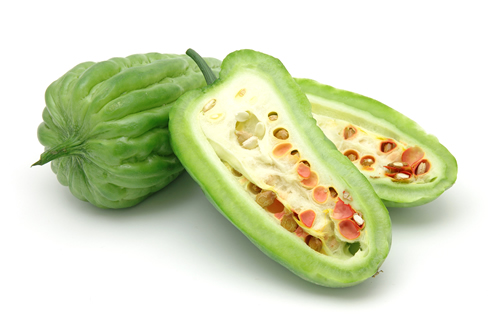Bitter Melon
- Bitter melon is a plant. The fruit and seeds are used to make medicine.
Contents
Uses
Bitter melon is used for various stomach and intestinal disorders including:
- Gastrointestinal (GI) upset
- Ulcers
- Colitis
- Constipation
- Intestinal worms
Other Uses:
- Diabetes
- Kidney stones
- Fever
- Psoriasis
- Liver disease
- Starting menstruation
- Supportive treatment for people with HIV/AIDS.
- Topically, bitter melon is used for deep skin infections (abscesses) and wounds.
- Bitter melon is used as a vegetable in India and other Asian countries and as an ingredient in some kinds of curries.
Benefits
- Bitter melon contains a chemical that acts like insulin to help reduce blood sugar levels.
Cautions
- Bitter melon fruit is POSSIBLY SAFE for most people when taken by mouth in the short-term. The safety of long-term use (beyond 3 months) is not known. There also is not enough information about the safety of consuming other parts of the bitter melon or applying bitter melon to the skin.
- Pregnancy and breast-feeding: Bitter melon is LIKELY UNSAFE when taken by mouth during pregnancy. Certain chemicals in bitter melon fruit, juice, and seeds can start menstrual bleeding and have caused abortion in animals. Not enough is known about the safety of using bitter melon during breast-feeding. Stay on the safe side and avoid use.
- Diabetes: Bitter melon can lower blood sugar levels. If you have diabetes and take medications to lower your blood sugar, adding bitter melon might make your blood sugar drop too low. Monitor your blood sugar carefully.
- Glucose-6-phosphate dehydrogenase (G6PD) deficiency: People with G6PD deficiency might develop “favism” after eating bitter melon seeds. Favism is a condition named after the fava bean, which is thought to cause “tired blood” (anemia), headache, fever, stomach pain, and coma in certain people. A chemical found in bitter melon seeds is related to chemicals in fava beans. If you have G6PD deficiency, avoid bitter melon.
- Surgery: There is a concern that bitter melon might interfere with blood sugar control during and after surgery. Stop using bitter melon at least 2 weeks before a scheduled surgery.
Interactions
Moderate Interaction–be cautious with this combination:
- Medications for diabetes (Antidiabetes drugs) interacts with BITTER MELON: Bitter melon can decrease blood sugar levels. Diabetes medications are also used to lower blood sugar. Taking bitter melon along with diabetes medications might cause your blood sugar to be too low. Monitor your blood sugar closely. The dose of your diabetes medication might need to be changed.
- Some medications used for diabetes include glimepiride (Amaryl), glyburide (DiaBeta, Glynase PresTab, Micronase), insulin, pioglitazone (Actos), rosiglitazone (Avandia), chlorpropamide (Diabinese), glipizide (Glucotrol), tolbutamide (Orinase), and others.
Other Names
African Cucumber, Ampalaya, Balsam Pear, Balsam-Apple, Balsambirne, Balsamine, Balsamo, Bitter Apple, Bitter Cucumber, Bitter Gourd, Bittergurke, Carilla Fruit, Carilla Gourd, Cerasee, Chinli-Chih, Concombre Africain, Courge Amère, Cundeamor, Fructus Mormordicae Grosvenori, Karavella, Kathilla, Karela, Kareli, Kerala, Kuguazi, K’u-Kua, Lai Margose, Margose, Melón Amargo, Melon Amer, Momordica, Momordica charantia, Momordica murcata, Momordique, Paroka, Pepino Montero, Poire Balsamique, Pomme de Merveille, P’u-T’ao, Sorosi, Sushavi, Vegetable insulin, Wild Cucumber.
References
Source: WebMD, “Bitter Melon”, www.webmd.com/vitamins-supplements/

